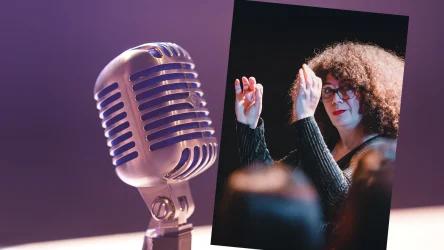
Chris Drukker
Our Classical Californian this week is jazz violinist Regina Carter – who’s a new faculty member at UCLA’s Herb Alpert School of music… She‘s going to share some of the music that’s accompanied her from when she was a four-year-old violin student to where she is today. That includes some of the pioneers of the jazz violin, including Eddie South and Ray Nance, along with a couple of takes on a Debussy tune, a dynamic women's string orchestra from Cuba, plus Saint-Saëns, Orff, Arvo Pärt and more!
She begins with one of her jazz violin heroes, Eddie South, playing his version of Fritz Kreisler's "Praeludium and Allegro."
Kreisler: Praeludium and Allegro (Eddie South)
Then it's a double dose of Debussy, with his work originally for piano called "Reverie" - (here in a piano roll performance by Frederico Bufaletti) and then Ella Fitzgerald's take on it.
Debussy: Reverie (Bufaletti)
Ella Fitzgerald: My Reverie
Up next, the all-women chamber orchestra from Cuba called Carerata Romeu recorded this piece, "Camerata en Guanguanco," based on traditional Cuban rhythms.
Camerata Romeu: Camerata en Guanguanco
The hauntingly beautiful Fratres by Arvo Pärt is next, with violinist Gidon Kremer and pianist Keith Jarrett.
Arvo Pärt: Fratres
Then another of her jazz violin predecessors, Ray Nance, featured as the soloist in this section of Duke Ellington's Black, Brown, and Beige called "Come Sunday."
Duke Ellington: Come Sunday (featuring Ray Nance)
Regina Carter's experience as a violinist was partially shaped by experiencing Carl Orff's "O Fortuna" from Carmina Burana as a young orchestra player.
Carl Orff: "O Fortuna"
Another tune she discovered (and fell in love with) at a young age was Saint-Saëns "The Swan" from Carnival of the Animals.
Saint-Saëns: "The Swan" (Kanneh-Mason family)
And finally, music by Aaron Copland, from his ballet Billy the Kid, "Billy's Death."
Copland: "Billy's Death"






